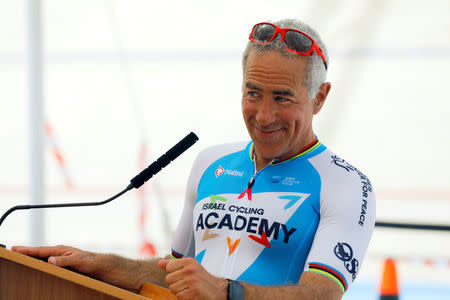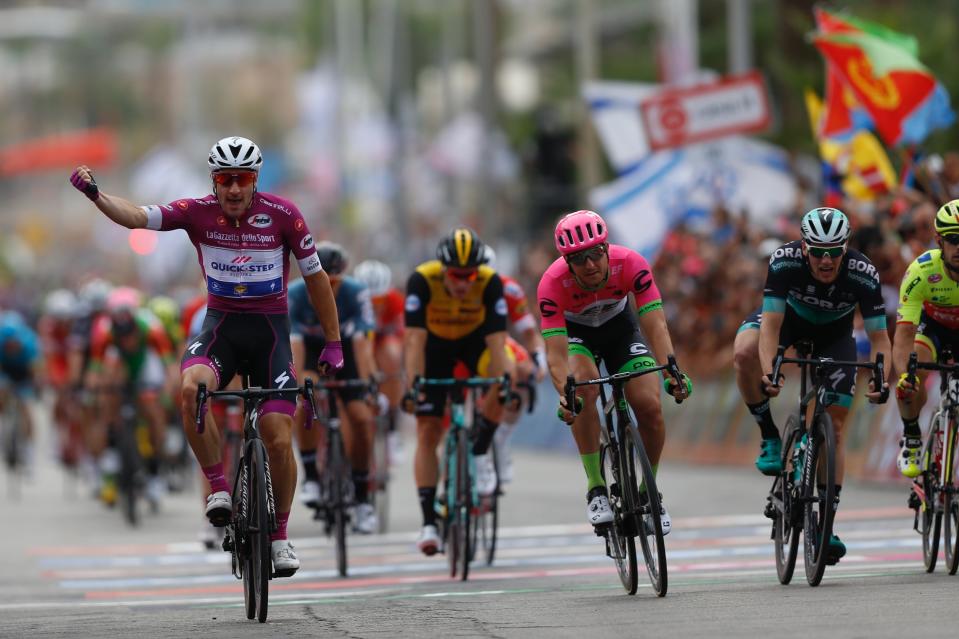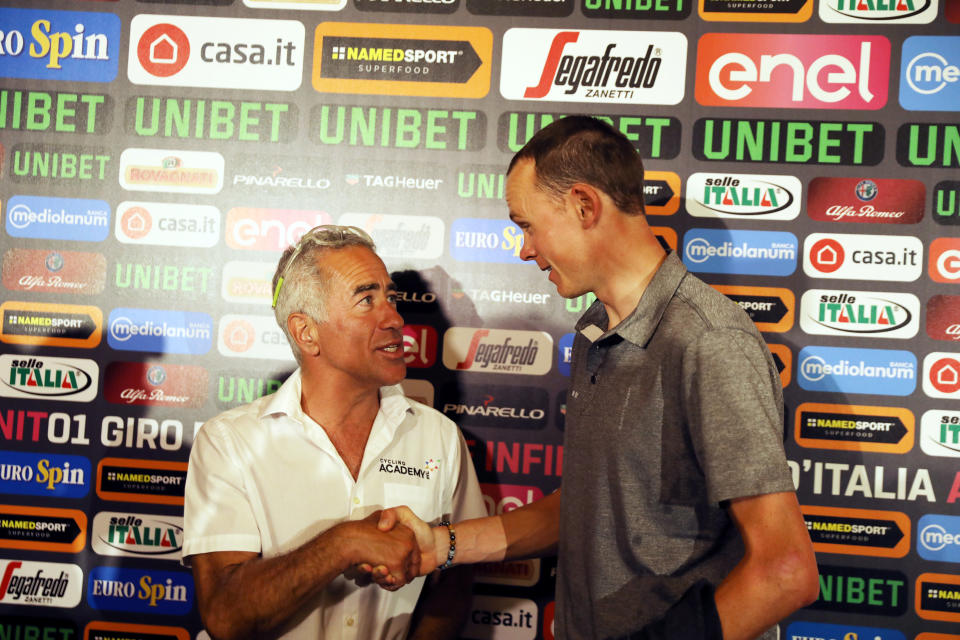The Montreal billionaire bringing cycling to the Mid East

Sylvan Adams is double-booked and juggling three conversations. We’re supposed to speak this morning but his photo shoot with an Israeli magazine is now running long. He’s in his north Tel Aviv penthouse overlooking the Mediterranean. At US$34.8-million it was the most expensive home in Israel when he bought it in 2014. I’m waiting on the line in Toronto. Adams is negotiating between the camera crew, his assistant and me, the sticking point being when all of this publicity will be coming out. Naturally, the magazine doesn’t want their piece scooped by this one, and Adams has no interest in any of this coverage getting scuttled.
Of all of the things Adams inherited from his family, a penchant for media appearances is not among them. Not from his father, at least. Marcel Adams eschewed the spotlight so assiduously while building Montreal-based Iberville Developments into a billion-dollar real estate empire, that he was included among Canada’s ‘Hermit Kings’ in the Globe and Mail’s 2006 detailing of the country’s most reclusive moguls.
Marcel’s youngest son suffers from no such shyness. Indeed, Sylvan has an impassioned story he wants to tell…. As well as a few other thoughts on politics, history and the media that he’s more than happy to share. His main message and animating force though is his love for Israel. Specifically, his desire for the country to be seen by others in the same light that he sees it. A second, complementary mission is his devotion to cycling; as an elite sport, a societal good, and as a conduit for showcasing all that is wonderful about a place.
At the beginning of May, all of these threads were woven together in a three-day, globally-watched celebration of sport in the Holy Land.

The reason for the race
“Correction….” Adams stops me in mid-sentence. “I am THE guy who brought the Giro to Israel”. In asking about his part in persuading one of the world’s most prestigious bike races to begin this year in Jerusalem, I clearly must have inferred a less starring role for Adams. And if so, the mistake is all mine. He is unequivocally the reason the Giro D’Italia held its first three stages in Israel, before finishing the remaining 3,100km of the tour in Italy.
In the world of pro cycling, or even in Middle Eastern sports, that’s no small matter. Never before in the race’s 101-year-old history had any section of it been staged outside of Europe. For Adams though, that’s only part of a much-bigger plan. The end-game is to elevate cycling in the country he now calls home. His mission includes funding a network of bike lanes connecting Tel Aviv, building a world-class velodrome to promote track cycling, and sponsoring a racing team to both compete on the pro circuit, and to inspire young Israelis to pick up the sport. Think of Vince Carter and Steve Nash capturing the imagination of Canadians in the aughts and sparking a northern pipeline of new talent straight into the NBA. That’s what Adams is seeking to emulate in Israel.
For those unversed in the magnitude of pro cycling, which, fairly enough is pretty much everyone in Canada, it’s tempting to dismiss the Giro D’Italia as simply a smaller, less famous version of the Tour de France. (And that’s if you have heard of it at all).
While inarguably true that the Giro is not “The Tour”, the race remains enormously significant. Total viewership is pegged somewhere between 775 million and a billion people, figures that easily exceed every Winter Olympics on record. This May’s race was broadcast in 198 countries, making it one of the most globally-seen sports events in history.
For Adams, it’s these facts almost as much as the cycling itself that fueled his desire to land the race, and led him to pick up US$16-million of the US$20-million price tag to host the opening stages. He is absolutely determined that Israel be in the spotlight for something other than sectarian strife and religious fanaticism. That this has been so rarely the case recently is a source of overweening frustration for Adams. It takes little prompting to get him speaking at length about the easy mix of Arabs and Jews on the Tel Aviv boardwalk at dusk, or of the Israeli doctors who tend to Arabs in need. The fair-minded police, the restaurateurs welcoming all… the harmony knows no bounds.
Adams places the fault of these truths not being more widely appreciated firmly at the feet of the media, and their myopic obsessions with the narrowest of topics. If there’s a focus on the tensions here, he insists, seemingly without irony, it’s a function of lazy journalists preferring the comforts of their hotel, rather than deigning to witness what’s actually going on in the country.
When he warms to a topic, you get the sense that Adams has grown comfortably accustomed to being either the family heir or the most generous benefactor at the table. Dissenting views or doubts offered seem very unfamiliar. Still, there is no questioning his sincerity or his wish that more of Israel could be seen as peaceful and colourful as the beaches of Tel Aviv.
One small, symbolic step to improve the narrative, and strike a more hopeful note is Adams’ decision to add the image of a dove with an olive branch in its mouth – the logo of the Peres Center for Peace and Innovation – to the jerseys of the Israeli racers in the Giro.
Unfortunately, those patches could do little to prevent the bloody clashes that flared up on the Gaza border, within two weeks of the race, killing 60, injuring 2,700 and almost completely dominating international coverage of the country for the rest of the month.
In fact, local tensions almost derailed the event before its start. When the Giro announced it was coming to Israel, they said the first stage would be in ‘West’ Jerusalem, a distinction that exists only if there is also ‘East’ Jerusalem, the part of the city long viewed by Palestinians as their future capital. All this to say that Giro representatives were either sending an extremely political message or operating with a very outdated map. Regardless the message from the Israeli government was unequivocal: Remove all references to a ‘West’ or count us out. Race officials quickly capitulated.
And so, on Friday, May 4 176 riders lined up along the edge of Jerusalem’s Old City. Spectators crowded the sidewalks and no less a figure than beloved, if tarnished, cycling legend Lance Armstrong covered the event from Tel Aviv. On his podcast, The Move, Armstrong spoke glowingly of the organizers, the country and the celebratory spirit on the street. For Adams, it was exactly the kind of publicity he so fervently wanted to garner for the event. (That Armstrong cited him by name as the one who made it possible could only have been a deeply gratifying bonus).

On centre stage
If things could get any better, they did shortly afterwards when Adams stood at the podium and presented the pink jersey to the stage winner, and last year’s champion, Tom DuMoulin. Even standing next to DuMoulin would’ve undoubtedly been a thrill for Adams, himself an accomplished age-group cyclist. Despite only taking up the sport in his 40s, Adams has won 17 Quebec championships, six Canadian masters titles, and four Pan-Am gold medals. A natural athlete, he’s proved to be exceptional on the bike, deepening his passion and further propelling his current mission.
That includes the US$19-million velodrome in Tel Aviv which now bears his name, as well as his co-ownership of the country’s first professional team, the Israel Cycling Academy. Most significant however, at least in his adopted hometown, is the Sylvan Adams Cycling Network, an extensive system of paths linking Tel Aviv to the neighbouring suburbs.
One of the benefits of being a billionaire is that you can make a splash, and that Adams most certainly has done since moving to Israel two years ago. His endowments extend from a US$21.5-million sports institute to an award honoring exceptional newcomers to the country. And Adams is now part of that number, having stepped down from the CEO’s post at Iberville and officially immigrated to Israel. When asked about the decision, in his late 50s, to leave Canada for good, Adams declines to explain further. And that’s fair enough. Anyone who’s endured five decades of Montreal winters, the majority of those years in the commercial real estate business, requires little explanation for choosing to spend the next phase of their life in infinitely warmer Tel Aviv, especially if that time is going to be spent in a sprawling two-storey penthouse on the Mediterranean.
It is the view that Adams sees when he looks out the window… the beach, the boardwalk, the families picnicking on the sabbath, that he wants to share. “People visit me, they come here, and experience the place, and they can’t believe it,” he says. “There is peace here. That’s what I want people to know.”


